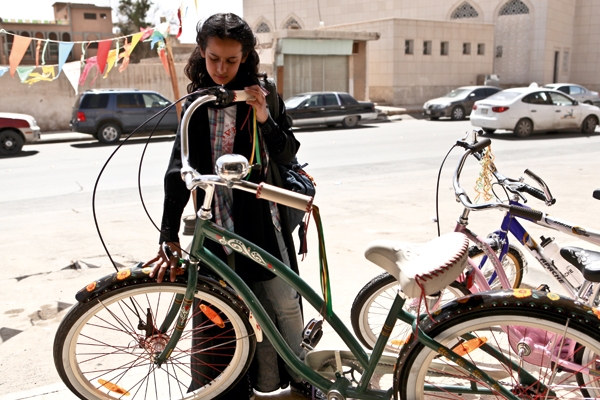Wadjda is the first feature-length film to come out of Saudi Arabia, and was shot by the country’s first female director, and although people will talk about how it breaks boundaries and how pioneering it is, that’s not what you most need to know. What you most need to know is that it’s fascinating, involving, moving, an entirely excellent film in its own right and, therefore, rather unlike The World’s End, which isn’t. It also has a few good jokes in it, which is rather unlike The World’s End, too. And it treats women as worth more than a quick shag in a toilet, which The World’s End doesn’t, just so you know.
The story is a seemingly simple one: Wadjda is a ten-year-old girl living in Riyadh whose ambition is to buy a bicycle so she can race her friend, a boy, Abdullah. It’s that simple, on the surface, but Haifaa Al-Mansour (the director, and also writer) gently plays with it so we understand a little of what it’s like to live as a woman in such an oppressive regime. Wadjda (Waad Mohammed) is great. She is spirited and wryly subversive, listens to loud foreign music and wears forbidden sneakers under her abaya. Wadjda yearns for a bike like nothing else, but her mother refuses to buy her one as bikes are frowned upon for females, as they are thought to compromise virtue. Her mother has her own problems anyway. Her husband, Wadjda’s father, is on the brink of taking a second wife plus there is the daily frustration of not being able to get anywhere without a man to drive her. (It’s tantamount to being a prisoner.) Wadjda tries various ways to earn money and eventually decides to enter a school Qu’ran-reciting competition, with its cash prize, much to the surprise of her strict headmistress. She is always in trouble with the headmistress, even if it’s just for laughing in public. (What if a man had been present? the headmistress asks. ‘A woman’s voice,’ she then reminds Wadjda, ‘is her nakedness.’)
OK, Wadjda is a type — irrepressible kid refusing to be stifled, etc.; the bike as symbol of freedom, etc. — but Al-Mansour somehow makes it fresh, and it is all so gently done. When, at the end, Abdullah tells Wadjda he is going to marry her when they are older it could be seen as capitulation — yes, you’re still marriageable — but I would say it’s more that the film doesn’t wish to fight the culture, but speak with it. I don’t have the space here to tell you what it took to get this film made (you’ll have to look it up) or the fascinating glimpses it offers into the daily lives of these women, and the men, but I can tell you it’s wonderful. Rather unlike The World’s End, which isn’t.
The World’s End is the latest film from Simon Pegg, Nick Frost and Edgar Wright and either I’ve been slowly losing my sense of humour over the years — nope, just checked my pockets; still there — or these films been operating to the law of diminishing returns: Shaun of the Dead (good; funny); Hot Fuzz (OK; a few laughs); The World’s End (horrid; just horrid). This story is simple, without being deceptively so. Gary King (Pegg) is a thirty-something loser, although that may be the least of his problems, as he’s also a complete dick of the kind who bounces off the walls like a toddler with ADHD and keeps urging his friend Andy to drink, even though Andy is a former alcoholic, and insists on following The One Woman In The Cast (being quite nerdy, I counted; 24 named male cast members, one woman) to the toilet in the hope of a quick shag.
Anyway, Andy persuades a group of old school friends to revisit their home town, Newton Haven, where, 16 years earlier, they failed to finish a pub crawl. Gary remembers the crawl as ‘the best day of my life’ even though, we later learn, it ended so calamitously no one would ever wish to think of it again, let alone relive it, but this doesn’t seem to bother the scriptwriters (Wright, Pegg). His friends are played by every British character actor who has had his teeth done (Eddie Marsan, Paddy Considine, Martin Freeman) and the one who hasn’t (Frost). Their characters are thinly sketched, so much so that Considine’s doesn’t really exist for any other reason than that he, too, wishes to shag The One Woman In The Cast in the toilet. Most tragically, The One Woman In The Cast is played by Rosamund Pike, who has more than proved her comic worth (she was hilarious in An Education), not that she has to prove anything. Still, at least the friends’ wives, who are at home, are referred to warm-heartedly, or would have been if only they weren’t such nags.
Eventually, the film descends into a lot of sci-fi silliness once it’s discovered Newton Haven’s residents are actually zombies, or something, and a lot of repetitive fighting during which all comedy is forgotten, not that there ever was any, or not that I found it funny. (Nope, just checked again; still there.) I really do believe that anything goes, more or less — even unthinking, lazy sexism — so long as it makes me laugh. It’s like a pass that gets you into places that would otherwise be forbidden, but The World’s End doesn’t earn its pass and doesn’t earn it by a long shot. It’s just boring. Unlike Wadjda, which isn’t.






Comments